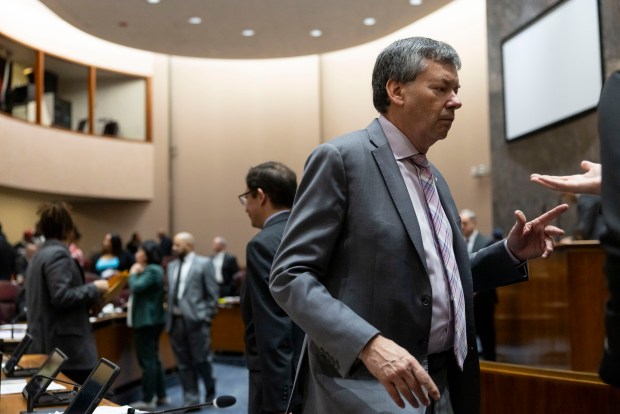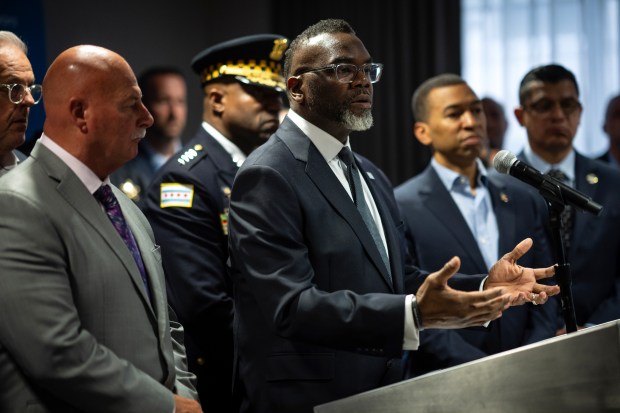Mayor Brandon Johnson wavered Monday on the idea of giving Chicago police the power to declare “snap” curfews to rein in so-called teen takeovers, days before aldermen are set to consider such a measure.
Johnson sidestepped questions about how he will respond to the curfew push led by Ald. Brian Hopkins in the wake of two recent high-profile, large teen gatherings that ended in shootings. The mayor pointed to ongoing negotiations, but did not say what he wants to see enacted.
“This is about keeping people safe, but it’s also about making sure that we are policing constitutionally,” Johnson said during a news conference following a safety-focused summit with mayors and police chiefs from across the country. “I brought people together to come up with a plan that ensures maximum safety, and we’ll see what that product ultimately lends itself to be.”
If the mayor fails to find a compromise that wins over aldermen, he could once again find himself in a public safety faceoff with the City Council. At least 31 aldermen signed on to the ordinance introduced by Hopkins this month that would give police brass the power to declare curfews when mass gatherings are expected or ongoing.
Aldermen plan to first weigh Hopkins’ measure Wednesday at a Public Safety Committee meeting. If it passes the committee, it could face a final City Council vote next month. Johnson did not clearly answer Monday when asked if he would override the council with a veto if it passes an ordinance he does not support.
Hopkins, 2nd, had initially pushed for the passage of a long-stalled ordinance that would have lowered the teen curfew downtown to 8 p.m. from the current citywide 10 p.m. time. But the downtown aldermen called off an expected close vote two weeks ago and instead proposed a different curfew-related measure, citing hope that middle ground would be reached.
Hopkins said Monday afternoon Johnson has made clear his general discomfort with a curfew, but added police Superintendent Larry Snelling has said it could be an effective tool properly applied with guardrails.
The downtown alderman praised the ongoing discussions with Johnson’s administration, Snelling and constitutional lawyers that continue to shape the ordinance. He expects the initial vote on a final draft to move forward Wednesday, he added.
Hopkins mostly declined to discuss what has changed in the ordinance, but noted one alteration: At Johnson’s request, he agreed to narrow the ordinance so that only the superintendent — and not district commanders and their deputies — could declare the curfews.
“That seemed a reasonable concession. You want the superintendent to be involved in a decision like that anyway,” he said. “I think we’re very close to having an ordinance here that will pass with a veto proof majority.”
Ed Yohnka, spokesperson for the American Civil Liberties Union of Illinois, told the Tribune earlier this month that Hopkins’ latest proposal “raises just as many questions” as his first one, arguing the ordinance is unnecessary and could violate constitutional rights.
Johnson said Monday imposing curfews has not changed “the outcome of the type of activity we’ve seen in certain sections of the city.” He added that the violent large gatherings that sparked the policy discussion are not unique to downtown.
The mayor also questioned the constitutionality of Hopkins’ original measure. And he dodged again when asked a second time if he would veto a curfew ordinance, instead turning his attention to two dozen mayors and police chiefs who flanked him at a downtown U.S. Conference of Mayors public safety conference.
“One thing I can say for sure, the mayors and the chiefs do not have curfews, they can spend as much money as they want all throughout the night, because I’m going to need that revenue to continue to invest in people,” he said.
But his hand-picked police superintendent had more to say at the Monday news conference.
Snelling said a preemptive curfew could be a useful tool, but added that he did not want to give “a concrete answer right now” on his support, “until we have the finished product.” He described the possibility of using a curfew to prevent potentially chaotic gatherings from ever occurring.
“The key” would be using a new curfew ordinance as a deterrent, “not using it to lock people up,” he said, reiterating the need for constitutionality.
“What we want to do is prevent violence. We want to prevent young teens who are coming down to wreak havoc on the city, to not form up,” Snelling said. “If we wait for it to happen, there’s a possibility that it could end in violence.”
The large gatherings that have sometimes ended in headline-grabbing violence in recent years often attract teen crowds with flyers that police become aware of beforehand, he said.
“When that happens, we want to make sure that we have tools in place to prevent it from happening. That’s it in a nutshell,” he said. “What we don’t want are people, and especially our youth, who are down there just trying to have a good time, getting caught up in the shuffle.”

Both the mayor and superintendent touted steep drops in violent crime across the city through the first four months of the year. Homicides have dropped 25% so far this year, according to CPD, a decline Johnson acknowledged matches trends seen across the country.
But federal cuts to things such as community violence prevention work could threaten gains in safety, he added.
“Anything that defunds the quality of life experience for families is a threat to our overall community safety,” Johnson said. “Whether it’s education, whether it’s Department of Justice, whether it’s health care.”



